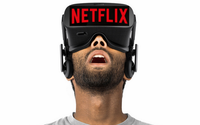Is Over-The-Top Over? Oculus/Netflix Deal To Bypass Screens Altogether
- by Gavin O'Malley @mp_gavin, September 25, 2015
 As part of a broader rollout of Facebook’s Oculus initiative, Netflix just debuted a simulated living room where users can comfortably -- in virtual terms,
anyway -- select movies, TV shows, and the like.
As part of a broader rollout of Facebook’s Oculus initiative, Netflix just debuted a simulated living room where users can comfortably -- in virtual terms,
anyway -- select movies, TV shows, and the like.Users can currently enter Netflix’s new artificial environment using Samsung’s Gear VR headset -- and when it launches early next year,
Facebook’s Oculus VR headset.
To develop the experience, Netflix worked directly with Oculus and its chief technology officer, John Carmack. “Honestly, John did most of the development
himself,” Anthony Park, vice president of engineering at Netflix, explains in a new blog post.
Facebook is taking a number of steps to get people excited for virtual reality, and capitalize on its $2 billion acquisition of VR leader Oculus. To that end, the social
giant officially debuted 360-degree "spherical" videos in News Feed this week.
The social giant has also
enlisted some big publishers and media brands to start pumping out 360-degree videos. They include Discovery, GoPro, NBC’s Saturday Night Live, VICE, LeBron James & Uninterrupted, and with
the help of Disney and Lucasfilm, Star Wars.
To create the videos, a special set of two dozen or so cameras are arranged in spherical form. As a result, when the
resulting video is streamed, users can choose what angle they want to see it from.
Earlier this year, Facebook began testing spherical videos. CEO Mark Zuckerberg was
especially upbeat about the technology's potential during Facebook’s annual F8 developer conference in March. Facebook is also reportedly working on a stand-alone video app that will support
360-degree “spherical” videos. As sources told The Wall Street Journal, the fate and launch date of the service remains unclear.
The greatest potential for the new videos will come when Facebook launches its Oculus Rift virtual reality headset sometime next year. By 2020, virtual
reality will represent a $30 billion market, while augmented reality will be a $120 billion market, according to a recent forecast from Digi-Capital.
2 comments about "Is Over-The-Top Over? Oculus/Netflix Deal To Bypass Screens Altogether".
Read more comments >
Next story loading 



First, I'd like to have one. Second, the cost would seem prohibitive for the benefit derived. I suspect the idea will provide something new to do when you can't sleep.
I'm a bit confused by the premise since VR is a screen.
The challenge is for content owners and makers and distributors to form models for this new world, but it's not radically different, it just means finding pipes and interfaces for the future.
We need to stop thinking TV, Mobile, Tablet, VR and just think internet connected screens.